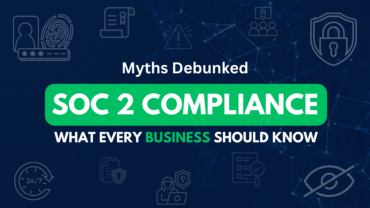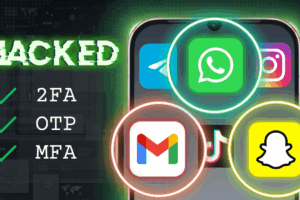SOC 2 Compliance Myths Debunked: What Every Business Should Know
In this guide, we’re going to break down the SOC 2 compliance myths and reveal the truth behind what it takes to protect your business and build trust with your customers.
You’ll learn how to position your organization as a trusted, secure partner that enterprise clients can’t ignore — unlocking bigger deals and long-term partnerships.
…without falling victim to misinformation, wasting money on unnecessary processes, or losing deals due to non-compliance.
By debunking these myths, you’ll gain clarity on how SOC 2 compliance works, understand the competitive edge it offers, and avoid the costly mistakes most businesses make.
This knowledge will set you apart, giving you a competitive edge in a world where trust and data security are everything.
Let’s get straight to it!
Understanding SOC 2 Compliance
SOC 2 compliance isn’t some mysterious, unattainable goal — it’s a framework that protects your business while reassuring your customers.
But before we dismantle the myths, let’s clarify what SOC 2 compliance actually means and why it matters.
What is SOC 2 Compliance?
SOC 2 compliance evaluates your organization’s ability to protect customer data based on the five Trust Services Criteria:
- Security (required): Keeping data safe from unauthorized access.
- Availability (optional): Ensuring systems are operational when needed.
- Processing Integrity (optional): Ensuring data is complete, accurate, and timely.
- Confidentiality (optional): Preventing unauthorized access to sensitive information.
- Privacy (optional): Ensuring data is handled in compliance with privacy laws.
Unlike other frameworks, SOC 2 is adaptable. It’s tailored to your specific business operations and doesn’t impose a one-size-fits-all checklist.
Why Does SOC 2 Compliance Matter?
In an era where data breaches can obliterate reputations overnight, it’s no wonder that 83% of compliance professionals rank adherence to laws and regulations (especially related to data security) as a key driver in decision-making processes.
SOC 2 compliance proves to your customers that their data is safe in your hands.
It’s also a deal-clincher; many enterprise clients won’t even consider working with you unless you’re SOC 2 compliant.
Common Myths About SOC 2 Compliance
You’ve heard the whispers, the rumours, and the complaints. Let’s tackle the most pervasive myths head-on.
Myth #1: SOC 2 is a One-Time Certification
This myth is like assuming a one-time workout keeps you fit forever. SOC 2 compliance is a continuous commitment.
Once certified, you’re expected to maintain and improve your controls. Regular audits — typically annual, validate that your systems are consistently operating as intended.
Neglecting ongoing compliance? Say goodbye to your credibility and hello to potential data breaches.
SOC 2 isn’t just about getting the stamp of approval; it’s about living up to it every single day.
Myth #2: SOC 2 Compliance is Prohibitively Expensive
Yes, SOC 2 compliance involves costs, but look at it as an investment, rather than an expense.
When you factor in the revenue you stand to gain from enterprise contracts, the ROI is undeniable. Moreover, the cost of not being compliant — lost deals, data breaches, and reputational damage far outweighs the upfront investment.
If you’re still on the fence, remember: SOC 2 compliance isn’t about what it costs today; it’s about what it saves you tomorrow.
Myth #3: SOC 2 and SOC 1 Are Interchangeable
Confusing SOC 2 with SOC 1 is a rookie mistake. SOC 1 focuses on financial reporting controls, while SOC 2 evaluates data protection practices.
Here’s the simplest way to remember:
- SOC 1: “Are our financial statements accurate?”
- SOC 2: “Is our business’s data secure from outside threats?”
If your business impacts client financial reporting, SOC 1 might be essential. If you handle sensitive data, SOC 2 is your go-to. Sometimes, companies need both, but they serve distinct purposes.
Myth #4: SOC 2 Guarantees Absolute Security
Achieving SOC 2 compliance doesn’t make your organization invincible — it minimizes risks.
Think of SOC 2 as a sturdy lock on your front door. It deters most threats, but a determined burglar might still find a way in.
SOC 2 compliance gives your customers peace of mind by proving you’re taking their security seriously.
While it’s not a guarantee against breaches, it’s a powerful layer of defence that reduces vulnerabilities.
Myth #5: SOC 2 Compliance is Only for Tech Companies
Wrong. SOC 2 compliance may have roots in the tech industry, but its relevance stretches far beyond.
Healthcare providers use SOC 2 to prove HIPAA-aligned practices. Financial service firms leverage it to safeguard client assets. Even e-commerce companies adopt SOC 2 to ensure customer data remains protected during online transactions.
If you handle sensitive customer data, SOC 2 compliance isn’t optional — it’s essential. It’s the universal language of trust in today’s digital economy.
FAQs
What’s the difference between SOC 2 Type 1 and Type 2 reports?
SOC 2 Type 1 evaluates the design of your controls at a specific point in time.
Type 2 goes a step further, assessing how well those controls operate over a period (usually 6–12 months). Type 1 is quicker to achieve, but Type 2 offers a deeper level of assurance to your clients.
P.S: Want to get the full picture? Read this blog on “SOC 2 Type 1 and Type 2: Key Differences Explained.”
Can SOC 2 compliance help with other frameworks like GDPR or HIPAA?
Absolutely! While SOC 2 isn’t a substitute for GDPR or HIPAA, its principles often overlap.
For instance, privacy and confidentiality controls in SOC 2 can align with GDPR requirements, making it easier to achieve multi-framework compliance.
How long does it take to become SOC 2 compliant?
For most businesses, achieving SOC 2 compliance takes 3–12 months.
The timeline depends on factors like your current security posture, the type of report (Type 1 vs. Type 2), and whether you use automation tools to streamline the process.
What happens if we fail a SOC 2 audit?
Failing doesn’t mean the end — it means an opportunity to improve.
Your auditor will highlight gaps in your controls, giving you a roadmap for remediation. Once issues are resolved, you can schedule a follow-up audit to demonstrate compliance.
Is SOC 2 compliance worth it for small businesses?
Yes. SOC 2 compliance can open doors to larger clients, streamline your operations, and reduce security risks.
For small businesses, it’s often the difference between competing with industry giants and being left behind.




